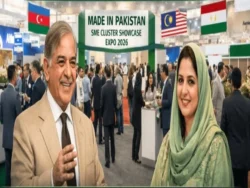THE PIVOTAL ROLE OF SIFC AND MILITARY LEADERSHIP IN ENSURING ENERGY SECURITY FOR PAKISTAN

By: Maria Mansab
The Government of Pakistan and KE have achieved a significant milestone in ensuring Karachi’s energy security by signing multiple agreements, marking a momentous occasion in the power sector. The signing ceremony occurred in the Energy Division and successfully settled enduring conflicts between the government and KE, primarily by formalizing and ensuring a stable provision of electricity from the National Grid to Karachi, up to the interconnection capacity. It is crucial to note that both SIFC and military leadership have played a constructive and influential role in the creation of this significant achievement.
Before this, through the joint efforts of the military leadership and SIFC, Pakistan’s interim government approved four significant deals with K-Electric (KE), the country’s largest privately operated power company. The agreements encompass the Power Purchase Agency Agreement (PPAA), the Interconnection Agreement (ICA), the Tariff Differential Subsidy (TDS) Agreement, and the Mediation Agreement. The Mediation Agreement is a significant factor that helps resolve past conflicts regarding debts and payments between KE and government institutions, such as Sui Southern Gas Company. The Government of Pakistan and K-Electric have officially inked essential agreements to ensure the energy requirements of Karachi.
These agreements have been carefully crafted through thorough discussions among different parties to tackle important issues that are crucial for ensuring Karachi’s sustainable energy future. This signifies the resolution of long-standing disputes regarding power purchase payments and electricity supply. The agreements, which were concluded three years ago, underwent a thorough review by multiple committees. However, previous governments showed reluctance to grant their approval. The recent confirmation of advancement indicates a readiness to make progress.
In response to the concerns voiced by the stakeholders from Saudi Arabia and Kuwait, the Executive Committee of SIFC, established under the guidance of Army Chief General Asim Munir, has formed a three-member committee to address the issues about KElectric. The objective of SIFC is to optimize the procedure for foreign direct investment (FDI) by eliminating barriers.
The agreements, disclosed by the SIFC, indicate a favorable path for sustainable solutions in the power sector. The signing not only establishes a clear plan for resolving other unresolved issues through mediation but also enhances stability for both KE and government institutions. The contribution of SIFC to facilitating these accords is remarkable.
Furthermore, there is an anticipation of enhanced relations between the central government and the provinces. This significant advancement, achieved through the SIFC initiative, not only helps to resolve the issue but also marks the start of a cooperative alliance between the government and business sectors.
This development holds significant importance for Pakistan as it signifies a fundamental change in the energy sector. The SIFC, the military task force, and other stakeholders exhibited determination and practicality in successfully concluding these enduring issues. Ensuring a consistent supply of energy to Karachi not only resolves the energy dilemma faced by the city’s customers but also ultimately reduces the burden of subsidies on the Government of Pakistan. Furthermore, the resolution of these issues will contribute to the advancement of economic growth and sustainability.
Pakistan is addressing a complex challenge in the power sector, aiming to enhance efficiency and establish long-term stability. The agreement between KE and the government is one aspect of this. SIFC has successfully resolved the issues related to bottlenecks. This showcases the dedication and determination of SIFC and military institutions towards the economic progress and prosperity of Pakistan. The SIFC is dedicated to creating a conducive environment for the power sector to flourish, with the ultimate goal of benefiting the people of Pakistan.
These initiatives in the energy sector are crucial for national progress. Efficiently addressing operational challenges and resolving longstanding concerns is crucial for Pakistan. This accomplishment will also serve as a strong and encouraging message to global investors who are considering Pakistan as a potential market. The energy sector is experiencing a significant transformation, creating opportunities for increased foreign investments.
The SIFC endeavors to facilitate policy reforms, resolve critical procedural concerns, and foster an investor-friendly environment through the allocation of foreign investment to specific sectors. SIFC serves as a mechanism to promote economic expansion, bolster international competitiveness, entice foreign direct investment (FDI), and incentivize employment generation, all of which contribute to the stability and security of the nation as a whole.
The military leadership at the SIFC ensures efficient facilitation of foreign direct investment in the country. With the military providing assurance, the investments from Riyadh and Dubai have been confirmed. The military’s presence in the SIFC creates a sense of stability and highlights the potential for significant and lasting policy changes to address fundamental structural challenges.
The SIFC and military leadership have played a vital role in positioning Pakistan as an attractive investment destination and shaping it into a market with immense potential. SIFC is poised to support investment and privatization in a wide range of sectors, including defense, strategic initiatives, agriculture, forestry, fishing, mining, development, technology, energy, and telecommunication, among others. This demonstrates the state’s commitment to attracting both domestic and international investment, as well as revitalizing the economy. The Council is committed to taking all necessary steps to foster, encourage, and support business and investment opportunities in the country.





